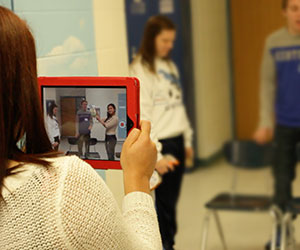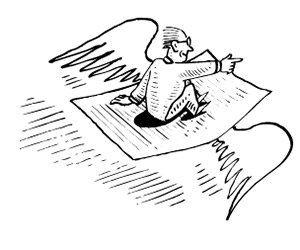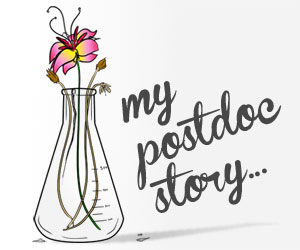Here at BenchFly, we’re always looking for new ways to use video to improve scientific research. During a recent conference in Europe, the value of using video to simply introduce a research topic hit home with me.
Flyceum: Your Science. Your Career.
We’re following in the tradition of open discussions among scientists that has resulted in important advances in both science and society.
The ART of Video Funded by the Gates Foundation
by
 When we started BenchFly five years ago, in 2009, our mission was to make research a better career for current and future generations of scientists. Today we continue to work toward this goal using video as the primary means to educate scientists in companies, in universities and now in high schools! In the fall of 2013, we were incredibly fortunate to have met Kentucky teacher Tricia Shelton (thank you, Twitter!) arguably one of the most energetic, passionate, and dedicated teachers out there. In less than 12 months, our collaboration has resulted in a new video-based curriculum, called The ART of Video™, and a Gates Foundation grant supporting further assessment of the program’s potential in the classroom. Thanks to Tricia, we’re engaging with and developing those future scientists we’ve been thinking about since 2009.
When we started BenchFly five years ago, in 2009, our mission was to make research a better career for current and future generations of scientists. Today we continue to work toward this goal using video as the primary means to educate scientists in companies, in universities and now in high schools! In the fall of 2013, we were incredibly fortunate to have met Kentucky teacher Tricia Shelton (thank you, Twitter!) arguably one of the most energetic, passionate, and dedicated teachers out there. In less than 12 months, our collaboration has resulted in a new video-based curriculum, called The ART of Video™, and a Gates Foundation grant supporting further assessment of the program’s potential in the classroom. Thanks to Tricia, we’re engaging with and developing those future scientists we’ve been thinking about since 2009.
Pipetting with Your iPhone?
by
 “Set timer for ten minutes.” Instead of the kitchen timers the rest of us use, the post-doc sitting behind me regularly uses Siri to time his experiments. As it turns out, it’s actually easier to tell a computer to set a timer for you than to do it yourself, and Siri is quickly becoming our lab’s newest research assistant. With a new iPhone model out each year, it’s not hard to believe that we’ll soon have everything we need on the little 2¼” x 4¾” device we can no longer go anywhere without. But what does that mean for us lab rats? And how can we leverage new technology to save us some time (something none of us ever have enough of)?
“Set timer for ten minutes.” Instead of the kitchen timers the rest of us use, the post-doc sitting behind me regularly uses Siri to time his experiments. As it turns out, it’s actually easier to tell a computer to set a timer for you than to do it yourself, and Siri is quickly becoming our lab’s newest research assistant. With a new iPhone model out each year, it’s not hard to believe that we’ll soon have everything we need on the little 2¼” x 4¾” device we can no longer go anywhere without. But what does that mean for us lab rats? And how can we leverage new technology to save us some time (something none of us ever have enough of)?
Stay Tuned…
by
Summer, 2014…what a great moment in history. Apple announced “Continuity” at WWDC, the 2016 US Presidential election is starting to ramp up (wait, WHAT!?), England and Spain were knocked out of the World Cup so fast I didn’t even have time to write a joke about bad refereeing and corrupt FIFA officials, and “Fargo” blazed through ten spectacular episodes on FX.
Avoid Pouring Chemicals–and Your Reputation–Down the Drain
by
Everyone in my new lab pours all sorts of solvents down the drain and says it’s ok because they flush with a lot of water. I’m a first-year graduate student so maybe this is how all labs work, but it seems crazy. Is there a way for me to bring this issue up without being the annoying newbie?
– anonymous, first year graduate student
Interview: The Future of Publishing and the Fear of Getting Scooped
by
 We recently reconnected with our friend, Eva Amsen Ph.D., and found that in the time since our last conversation she’s moved on to a new job (congrats!). Her new position at Faculty of 1000 has thrown her right in the middle of a topic many scientists are very interested in–the future of scientific publishing. In a world of ever-increasing numbers of journals and lower technological barriers to information sharing, it’s unclear whether most publications will survive. We recently spoke with Eva about her views on the future and how the fear of getting scooped may be a driver for a new model of publication.
We recently reconnected with our friend, Eva Amsen Ph.D., and found that in the time since our last conversation she’s moved on to a new job (congrats!). Her new position at Faculty of 1000 has thrown her right in the middle of a topic many scientists are very interested in–the future of scientific publishing. In a world of ever-increasing numbers of journals and lower technological barriers to information sharing, it’s unclear whether most publications will survive. We recently spoke with Eva about her views on the future and how the fear of getting scooped may be a driver for a new model of publication.
My Postdoc Story: Pre-faculty Fellow
by
 While nearly all of us face challenges during our postdoctoral years, we often feel alone in our struggles. In this series, we hope to share encouraging and uplifting stories of how other scientists were able to turn their situation around and move forward, despite a non-ideal situation. Like snowflakes, fingerprints, and nightmares, every postdoctoral experience is unique, so today we share the Postdoc Story of another successful scientist.
While nearly all of us face challenges during our postdoctoral years, we often feel alone in our struggles. In this series, we hope to share encouraging and uplifting stories of how other scientists were able to turn their situation around and move forward, despite a non-ideal situation. Like snowflakes, fingerprints, and nightmares, every postdoctoral experience is unique, so today we share the Postdoc Story of another successful scientist.
.[Continue Reading…]
How to Manage Junior Labmates Who are Older than You
by
I am currently half way through my Ph.D. Recently a new Ph.D. candidate joined our group. She is 35 this year while I’m in 25. She used to be a lecturer in another private university. She always bragged and boasted about her knowledge and achievements prior to joining our team. But then again, things turned out rather differently. She doesn’t seem to have basic lab skills like using the pH meter and unable to use some common sense in doing everyday work. In our culture, the older ones want respect from the younger ones but they don’t understand respect is something to be earned. The new Ph.D. student is also very egoistic despite her lack of experience in labwork but she constantly needs us to teach her. Some of the instruments were spoilt due to her negligence and her reluctance to ask–how should we deal with her? How do we deal with “juniors” who are very much older than us, in terms of age. I have been working in the lab for 3 years so I have a few publications which clearly demonstrated my ability while she has none. In certain ways I feel she is jealous of my achievement. What can I do? How can I improve the situations without hurting her feelings?
-Anonymous
Nanoparticles and Proteins, Part I
by
I’ve been absent for far, far too long, and before anything else, I’ll need to apologize for that. This new Enzyme Corner article will thus serve a dual-function: 1) telling a new enzyme/protein story, which is far overdue, and 2) bringing you up to speed on what I’ve been up to lately.
[Continue Reading…]
Using Your PhD Outside of Research
by
Are there certain career paths outside of research where the PhD dramatically helps your career advancement? I’m a third-year grad student planning on leaving the bench (to do what, I’m not sure) but I feel like I’m half way there so if getting the letters is important I could tough it out.
—MM, grad student



